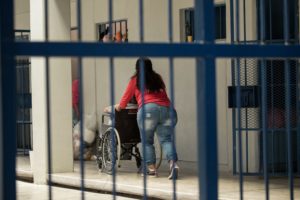The Washington Office on Latin America (WOLA) expressed concern over apparent political motivations behind the recent suspension of six cable TV stations in Venezuela, for infractions that included failure to broadcast government messages. One of the suspended stations, RCTV-International, is well known as a strident critic of the government of President Hugo Chávez.
The suspensions, which went into effect on January 24, have prompted public protests and violent confrontations in Venezuela that have left two people dead and dozens injured. WOLA calls on the Venezuelan authorities to conduct prompt, thorough and impartial investigations to hold accountable those responsible for the violence.
Contrary to some portrayals, public debate in Venezuela since President Chávez took office has been vigorous and vehement, with full-throated participation by opposition and government supporters alike. But according to WOLA Senior Associate John Walsh, "The suspension of RCTV-International in particular gives every appearance of being the result of a deliberate strategy on the part of the government to use the regulatory system to stifle an especially outspoken critic."
The Venezuelan government has both the authority and the responsibility to establish a legal framework for regulating the media, while respecting freedom of speech. The government should be clear about the requirements of the law, ensure that any penalties are commensurate with the severity of the infractions cited, and apply the law impartially and with procedures for appeal. Such a regulatory framework could certainly include reasonable requirements for the dissemination of official statements.
In practice, media regulation has been controversial in Venezuela, where both the government and sectors within the private media have fueled the country's extremely polarized political climate, each seeking political gain by demonizing the other. Indeed, influential private media organizations in Venezuela have behaved in an overtly partisan manner, even to the point of seeking the overthrow of the country's democratically-elected government. RCTV, for example, was among the TV stations that are widely understood to have actively supported the attempted coup d'ètat against President Hugo Chávez in 2002.
RCTV's owners have never been formally charged with criminal conduct in relation to 2002 coup attempt, but the government's non-renewal of the station's over-the-air broadcast license in 2007 was widely viewed as a reprisal against the station. Since then, however, RCTV-International has expanded its subscription cable viewing audience within Venezuela while maintaining its vociferously anti-government editorial stance.
Given the long-standing antipathy between President Chávez and RCTV-International, the recent cable suspensions raise concerns that media legislation and regulations enacted in recent months may have been designed not only for the legitimate purpose of regulating media conduct, but also to allow the government to take steps to silence RCTV-International.
WOLA urges both the Venezuelan government and RCTV-International to exhaust all mechanisms to resolve the current situation in a way that guarantees RCTV-International's right to freedom of expression while recognizing the government's legitimate regulatory authority.
Contact:
John Walsh
jwalsh@wola.org
(202) 797-2171

